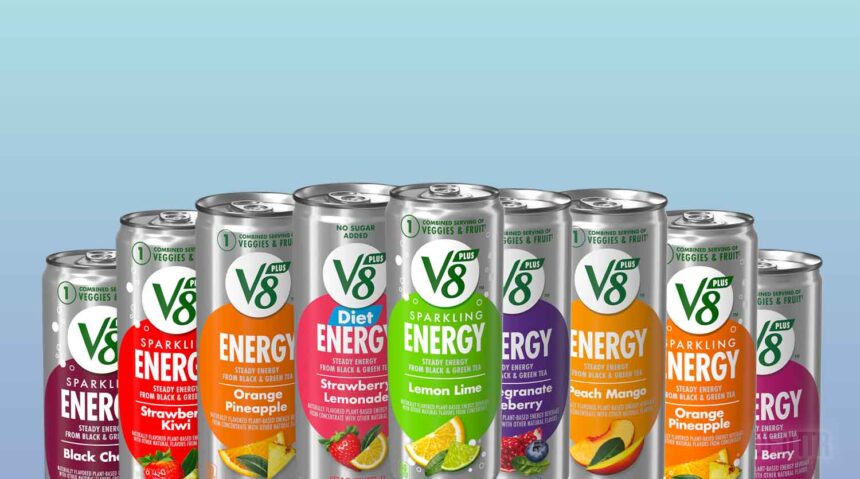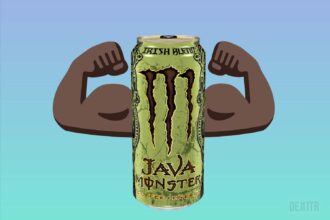V8 is a popular brand known for its tomato-based cocktail Juice. They are lesser known for their line of caffeine-based energy drinks.
Many users have got so habituated to the energy drink that they often consider it as a replacement for morning coffee. But wait, is it that healthy? What are the side effects of the V8 energy drink?
Key Takeaways:
The most common side effect of the V8 energy drink includes digestive issues, headaches, sleeping problems, anxiety, and dependency. However, these symptoms are more in effect when the beverage is consumed excessively. Once in a while consumption of the energy drink is fine.
Keep reading till the end as we do a detailed breakdown and analysis of the V8 energy drink ingredients, nutrients, and its pros and cons. By the end of this guide, you will have all the knowledge to decide whether or not you should include it as a part of your daily diet.
V8 Energy Drinks Side Effects
In a nutshell, the most common side effects of the V8 energy drink are associated with its caffeine and sucralose content.
Some of the well-known side effects of caffeine are anxiety, dehydration, headache, insomnia, and dependency.
The 8 oz energy drink contains 80 mg of caffeine, which is a moderate level. As long as you consume only 1 energy drink occasionally, there shouldn’t be an issue.
Another ingredient to watch out for is sucralose. It is an artificial sweetener, and the term ‘artificial’ can itself put you in worry. Sucralose is generally considered safe for consumption. The FDA has approved it as a food additive.
That said, it is still good to consume it in moderation to avoid any possible side effects. The side effects of sucralose when consumed in excess include affect on gut health, increased digestive issues, and imbalance in insulin and glucose levels of the body.
So, how often can you drink a V8 energy drink? At the most, you should avoid drinking more than one V8 energy drink per day. And to be on the safe side, if you drink only 1 energy drink per week, that’s best.
Now, before we dive into the ingredients and nutrition analysis of V8 energy drinks, remember that it comes in three different variants:
- V8 Energy Drink (main)
- V8 Energy Drink (diet variant)
- V8 Energy Drink (sparkling variant)
For the sake of this article, our main focus will be on the V8 energy drink (main version) that has 50 calories per serving. There are hardly any differences in the ingredients of the V8 energy drink diet, or sparkling version with the main V8 energy drink. So we will keep it to the main energy drink version.
The only difference is in terms of nutritional values and taste.
If you prefer your energy drinks to have only mild carbonation, then Sparkling variants are your way to go.
On the other hand, the diet version has fewer calories, only 10 calories per serving. Also, it is lower in terms of sodium and sugar content than the main variant. So it is perfect for health-conscious individuals.
There’s no difference between the Sparkling variant and the main variant in terms of nutrition. The only fact is it tastes slightly different than the main variant.
So with that cleared up, let’s take a closer look at the ingredients of the V8 energy drink.
V8 Energy Drink Ingredient Analysis
| Ingredients: | Overview: |
| Water | It is the primary component of the V8 energy drink. It is used as the main medium for the drink in which all other ingredients are added. |
| Vegetable Juice | To create a pleasing taste, the V8 energy drink includes juice made from different vegetables. Spinach, Beet, Carrot, and Sweet Potato are some of the domain vegetables used to prepare the mix for this energy drink. These vegetables are a good source of vitamins and minerals necessary for living a healthy life. |
| Fruit Juice | Some of the main fruits used to prepare the fruit juice mix of the V8 energy drink include strawberries, grapes, apples, kiwis, and mango. Each of these fruits is a rich source of vitamins, and other helpful compounds necessary for a healthy body. These fruits also add a nice flavor to the drink and make it more palatable. |
| Natural Flavorings | To further enhance the taste of the energy drink, natural flavors are used in the V8 energy drink. In general, natural flavors are ok to consume. |
| Malic Acid | Malic is a natural acid found in many fruits. It is used to add tartness and maintain the pH balance of the energy drink. In general, Malic acid is also safe for human consumption. |
| Citric Acid | It is a natural preservative found in many citrus fruits. It can enhance the flavor of the energy drink and can also enhance the flavor of energy drinks and also help in increasing its shelf-life. It is usually safe to consume and doesn’t have any adverse side effects. It is also present in lemon, so if you consume lemon, your body already has the habit of consuming citric acid. Nothing to worry about. |
| Vitamin C (Ascorbic Acid) | Vitamin C is an essential vitamin present in the V8 energy drink. This vitamin helps in immunity and also in iron absorption. It acts as an anti-oxidant and also helps in maintaining healthy skin. In adequate amounts, Vitamin C is totally safe. But increased sage can lead to side effects like diarrhea and vomiting. |
| Vitamin B3 (Niacinamide) | Vitamin B3 is important for better skin health and brain function. It is usually safe in appropriate quantities. However, overdose can cause side effects like stomach discomfort, diarrhea, and headache. |
| Vitamin B6 (Pyridoxine Hydrochloride) | Vitamin B6 plays a crucial role in brain development and ensuring a healthy nervous system. In normal amounts, it is safe, however, high dosage can lead to skin lesions or losing control of your muscles. |
| Vitamin B12 (Cyanocobalamin) | It helps in the formation of RBC (red blood cells) and plays an important role in the functioning of the nervous system. In moderation it is safe. Higher doses can have side effects like headache, nausea, and diarrhea. Our body usually absorbs vitamins only in the adequate quantity that is required, rest is excreted through urine. |
| Caffeine From Black and Green Tea | Just like any energy drink, Caffeine is the core ingredient of the V8 energy drink. It is what gives you the energy boost and the feeling of alertness after consuming the V8 energy drink. Caffeine is also present in coffee and it’s completely fine to consume in moderation quality. However, if you consume it in excess (the daily max limit is 400 mg), then it can have some side effects. The side effects of caffeine are headache, insomnia, anxiety, dependency, and restlessness. |
| Sucralose | It is an artificial sweetener added to energy drinks to add sweetness to the drink without adding too many calories. It is generally safe to consume in moderate amounts but it can have side effects because it’s an artificial ingredient. Some of the side effects of this ingredient include digestive problems, changes in glucose levels, and more. |
V8 Energy Drink Nutrition Analysis
| Nutrition Facts | Details |
| Serving Size | 1 can (8 o.z) |
| Calories | 50 |
| Total Carbs | 12 g |
| Total Sugar | 11 g |
| Sodium | 40 mg |
| Potassium | 140 mg |
| Vitamin C | 10 mg |
| Niacin | 3.2 mg |
| Vitamin B12 | 0.48 mcg |
| Vitamin B6 | 0.34mg |
Let’s do the nutrition analysis of the V8 energy drink.
Weighing in at just 50 calories a pop, it’s pretty light on the waistline compared to its heavyweight counterparts in the energy drink league.
Although it does have carbohydrate and sugar content, the quantity is much less compared to other energy drinks like Monster or Red Bull.
Here’s a quick comparison of the V8 energy drink with two popular energy drinks to give you an idea:
| Comparison | V8 Energy Drink | Red Bull Energy Drink | Monster Energy |
| Size | 8 oz can | 8.4 oz. can | 16 oz can |
| Calories | 50 | 110 | 230 |
| Carbs | 12 g | 28 g | 58 g |
| Sugar | 11 g | 27 g | 54 g |
As you can see the sugar and carb content of V8 energy drink is almost less than half of both Red Bull and Monster.
Now, onto sodium. This drink only holds 40mg of it per can. The recommended guideline is no more than 2,300mg daily, so V8 barely makes a dent in that quota. In the grand scheme of things, it’s just a drop in the ocean.
Potassium’s up next. Each can carry 140 mg. It helps in maintaining proper fluid levels in the body and plays a key role in regulating the heartbeat. And the recommended level is at least 3500 mg per day.
Sure, the quantity of potassium present in a V8 energy drink can is not going to get you to the recommended levels a day, but every little bit counts, right?
Moving onwards to Vitamins. Vitamin C is present in V8 energy drinks, with 10mg per serving. It’s not going to give you effective benefits since it is quite less than the recommended daily intake level of 90 mg. But hey, it’s a solid addition to your immunity and iron absorption.
Considering niacin – we’re talking 3.2mg in each can. It’s present at safer levels. The recommended daily intake level is 16 mg while the upper limit is 35 mg. Niacin is your metabolism’s best friend and a buddy to your skin, nerves, and digestion too. So that’s an added benefit.
Next, Vitamin B12 is present in 0.48 mcg per serving. Vitamin B12 is good for health and has many benefits if consumed in appropriate amounts. The required level is 2.4 mcg per day.
So even though you may not get a ton of benefit from the vitamin B12 in these energy drinks, it’s still a good addition to your diet.
Vitamin B6 is another ingredient present in the energy drink. The amount is 0.34 mcg per serving which is less than the recommended daily intake of around 1.5-2 mcg per day.
Finally, let’s talk about the heart and soul of energy drinks – Caffeine. The caffeine used in V8 energy drinks is sourced from black and green tea.
Speaking of caffeine, have you ever wondered if it can really help you to do your tasks more effectively? To learn more we highly recommend checking out our guide about caffeine and its impact on productivity.
The total amount of caffeine in the drink is simply 80 mg per 8 oz can which is similar to that present in a cup of coffee. This level of caffeine is also present in energy drinks like Red Bull. So there’s no big deal.
If you consume V8 energy drinks only once in a while, that too, only 1 can, you will only be intaking 80 mg of caffeine. The upper limit is 400 mg of caffeine. So you will always be on the safe side unless your body is too sensitive to it.
The bottom line? V8 Energy Drink is a nice energy drink. It’s not going to replace a balanced diet, but it’ll give some energy boost without compromising too much on the health side of things. Most of all the ingredients are either present in adequate or less than the daily intake limit of that respective energy drink. The only main concerning ingredient is sucralose.
If you’re looking for energy drinks without any artificial sweeteners like sucralose, I highly recommend checking out our guide on the best energy drinks without artificial sweeteners.
V8 Energy Drink: Pros And Cons
| Pros | Cons |
| Compared to other energy drinks, V8 is pretty low in calories | Artificial sweetener called Sucralose is present in the energy drink which can cause digestive issues as a side effect, especially if consumed in excess |
| Contains a range of vitamins like Vitamin C, B6, B12, and B3. | Even if caffeine is in moderate quantity, it is still an addictive substance and can cause dependency, and other issues if taken consistently |
| Filled with fruit and vegetable juice which contribute to the daily intake of necessary minerals and vitamins | If you’re sensitive to citrus or malic acid drink, then this energy drink wouldn’t be the right pick for you |
| Caffeine is derived from sources like green and black tea. Also, the quantity of caffeine is moderate (only 80mg per can) which makes it ideal for once-in-a-while consumption | Fruits and vegetable juices help in contributing to the daily vitamin intake. But the quantity of vitamins and minerals is less and the beverage is still an energy drink. So it shouldn’t replace a healthy balanced diet. |
Final Verdict: Is V8 Energy Drink A Healthy Beverage?
In short, V8 is a flavorful energy drink that can give you a moderate caffeine boost. It also comes loaded with various vitamins and minerals. So we can say that it is a good combo of juice and energy drink.
While it is low in calories, carbs, and sugar, it shouldn’t replace a healthy diet. Ultimately, the drink is fine to consume if you only take it occasionally.
We can’t give this drink full marks for being a healthy beverage because it does contain artificial sweeteners and moderate levels of carbohydrates. But comparatively, it is quite better and healthier than other energy drinks in the market.
FAQs:
Is V8 Energy Drink Bad For Your Heart?
In general, the V8 energy drink is not bad for your heart if consumed in moderation. Usually, high-calorie and high-sugar-containing energy drinks are bad for the heart, but the V8 energy drink is a relatively low-calorie beverage and low-carb beverage.
Can V8 Energy Drink Cause Diarrhea?
V8 Energy drinks can cause diarrhea only if consumed in excess. When consumed in moderation, the V8 energy drink is unlikely to cause diarrhea or stomach issues.
Are V8 Energy Drinks Good For Diabetics?
V8 energy drinks are not good for diabetics because even though it’s less, they do contain sugar and carbohydrate which is not preferable for people with diabetes.
Are V8 Energy Drinks Acidic?
V8 energy drink is acidic because it does contain malic acid, and citric acid which are slightly acidic in nature. Normally, V8 energy drinks don’t have carbonated water, so you won’t have to worry about fizz. Although if you do like slight carbonation, then you can try out their V8 +Sparkling Energy.













